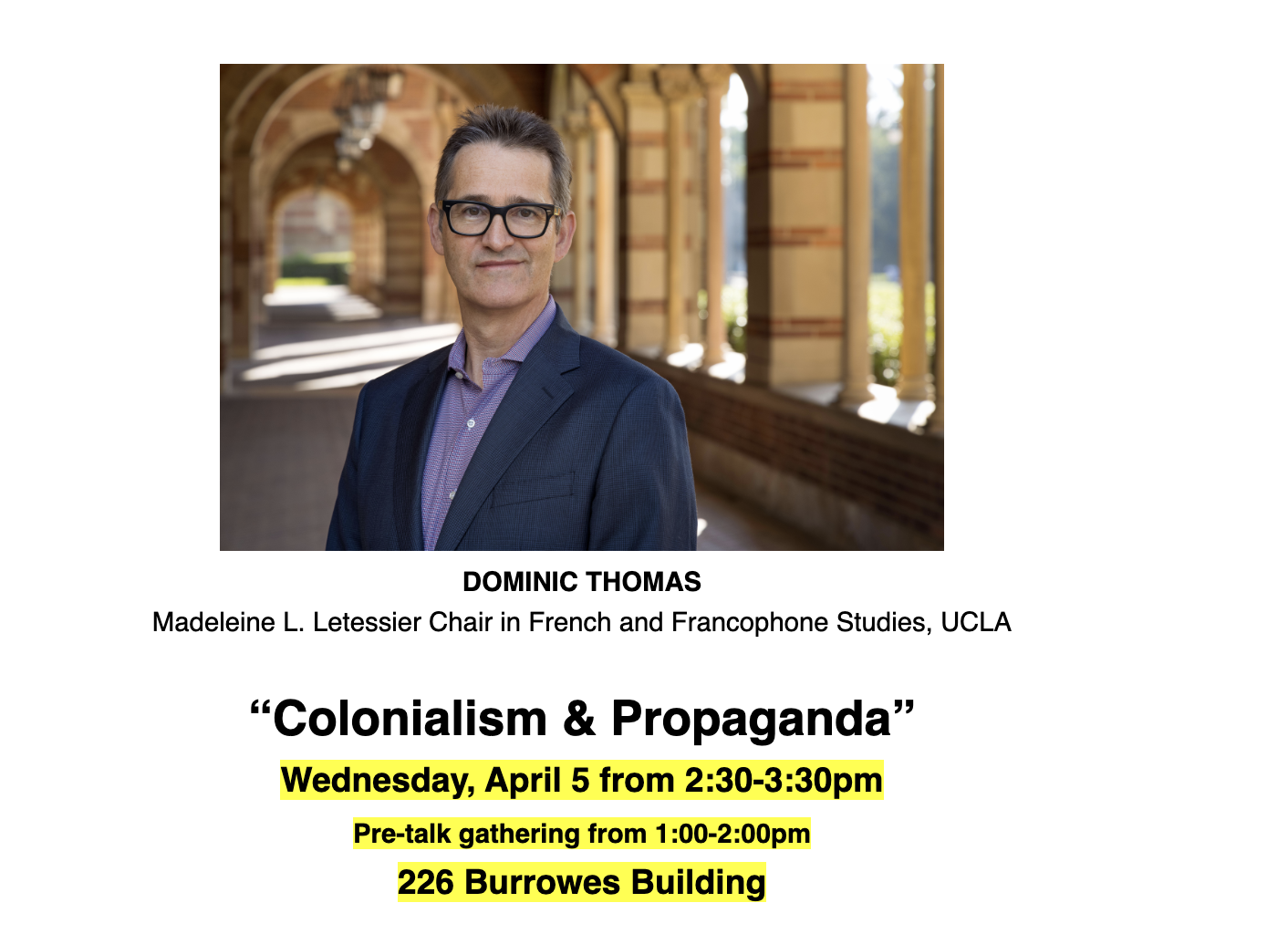Table ronde: “Colonialism & Propaganda”, Dominic Thomas, Madeleine L. Letessier Chair in French and Francophone Studies, UCLA
Propaganda, across geographic and historical time periods, remains of utmost relevance, especially today given how progandist mechanisms have been amplified by new technologies and polarizing rhetoric. Colonial propaganda fostered a sentiment of proximity and made the Empire familiar. Iconographic materials deserve additional scrutiny and can improve our understanding as to how generations of colonizing and colonized subjects were impregnated with these imaginaries. The fundamental questions of our time include restitution, reparation, historical accountability and responsibility, and the challenges and issues that come with renegotiations of memory, and the complex process of confronting revisionist arguments and systemic racism. The most visible examples have taken place in the public space and involved the damaging, destruction, defacing, removing, and toppling of public monuments, memorials, and statues. To this end, a close examination and decoding of these imaginaries becomes essential in order to understand the historical matrix and how it was instrumentalized to legitimize colonialism. This visual culture functions according to prescribed codes and signifiers designed to seduce and inspire, promote overseas investment interests, while simultaneously obfuscating distant wars, revolts, and uprisings. Colonial history continues to be distorted and instrumentalized. We are the heirs of these images, they are ingrained in culture and collective memory, have shaped mindsets, and need to be examined and confronted so that their unprecedented power of fascination and influence will no longer haunt us.
—
Dominic Thomas holds the Madeleine Letessier Chair in French and Francophone Studies at the University of California, Los Angeles, in the Department of European Languages and Transcultural Studies. He is an elected member of the Academy of Europe and the Global Diplomacy Lab, a Fellow of the Royal Historical Society, and Associate Member of the Centre of International History and Political Studies of Globalization at the University of Lausanne. He was awarded the Gutenberg prize in 2022 and holds the Gutenberg Research Chair (2022-2024) in “Ecology and Propaganda” at the University of Strasbourg. He has held fellowships, residencies, and visiting professorships in Australia, France, Germany, Mali, South Korea, Sweden, the United Kingdom, and the United States, and provides expert evaluations to international learned and professional societies. Professor Thomas’ research brings multiple fields into conversation, including literary studies and African and European Studies, and in such areas as globalization, censorship, propaganda, immigration, identity, museology, racism, human rights, and environmental studies. He regularly contributes op-eds, and has provided expert analysis as CNN’s European Affairs Commentator since 2016 on European elections, Brexit, the conflict in Ukraine, the European Union, NATO, the G7 meetings, and terrorism. He is author, co-author, editor or co-editor of numerous works including, most recently, Museums in Postcolonial Europe (2012), Africa and France (2013), Afroeuropean Cartographies (2014), Colonial Culture in France since the Revolution (2014), The Invention of Race (2014), Vers la guerre des identités (2016), The Colonial Legacy in France (2017), Sexe, race et colonies (2018), Sexualités, identités, et corps colonisés (2019), Visualizing Empire (2021), Colonisation & Propagande (2022), and Histoire globale de la France coloniale (2022). He edits the Global African Voices series at Indiana University Press that focuses on translations of African literature into English and has translated novels by Sony Labou Tansi, Alain Mabanckou, Emmanuel Dongala, and Abdourahman Waberi.
